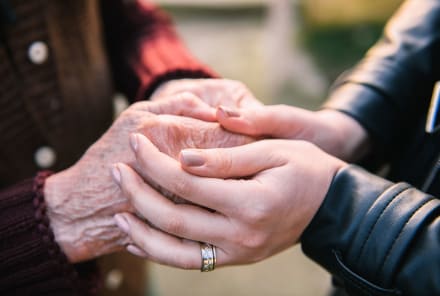Advertisement
12 Possible Reasons You're Single + What To Do If You Don't Want To Be

So, you want a serious relationship, but it's just not happening for you.
There are so many reasons people remain single even when they don't want to be, ranging from unconscious self-sabotage to systemic barriers to simple, uncontrollable happenstance.
If you're someone wondering Why am I single? often, consider the following roadblocks that may be getting in your way—as well as advice from dating experts on what to do to increase your odds of finding the partner you want, if that's what you want.
12 reasons people stay single:
Dating isn't a priority.
First and foremost, many people remain single because they simply haven't prioritized their dating life in any active way. They might dream of being in a committed relationship someday, yet they don't make time for social events or dates, brush off people who express interest, and keep their lives so busy that they wouldn't have time even if the right person came knocking on their door today. Work, exercise, friends, and hobbies take precedence, while dating is treated as an afterthought or given the ol' "if it happens, it happens" energy.
There's absolutely nothing wrong with prioritizing other parts of your life over dating, and if that's just what's most important to you at this time, own that and do it proudly! You get to decide what your priorities are, and your dating life can happen on the timeline that you choose. As well, sometimes you're in a period in your life when dating simply can't be a priority, even if you want it to be (e.g., you're raising young kids, you're dealing with grief or mental health struggles, etc.)—so cut yourself some slack.
Just know that just as your career isn't going to progress if you're not putting focused attention on it, dating today often requires some initiative and intentionality. While some people might meet a romantic partner organically just by going about their life, whether or not that happens to any given person is random. So if it hasn't been happening for you and you're feeling yourself craving partnership at this time in your life, it may be time to start investing in your dating life a little more actively.
You're letting fear hold you back.
"Fear is one of the top reasons I see people staying single," sex and dating coach Myisha Battle, M.S., tells mbg. "This includes fear of rejection, fear of starting an online dating profile, and fear of putting their intentions to be partnered forward."
You might want to prioritize your dating life but you're scared to actually lean all the way in and do it—because you're afraid of what others will think of you or afraid of getting hurt. Sometimes it feels safer to sit back and wait around for love to come to you or to say you're just "too busy" or "focusing on myself right now" than it is to openly admit you want a relationship and do the work it takes to make that happen.
You haven't met the right person.
Not in the clichéd way, but in the numbers way!
According to clinical psychologist Carla Marie Manly, Ph.D., sometimes people remain single longer than they might want to be because they simply haven't met the right person yet. "Despite the quest to be partnered, some people find that they can't find the right fit," she tells mbg.
Some of us are compatible with all sorts of people, while others need a certain type of personality or relationship dynamic for things to really "click." For people who fall into the latter group, it might simply take a little longer to wade through potential partners before you find someone you're truly compatible with.
You keep dating the wrong kind of people.
Now, sometimes people remain single because they actually have a faulty "radar" or "picker" for suitable partners—that is, the type of people they're attracted to or attempt to date are generally not the best for them.
There are many reasons people might constantly find themselves dating the wrong people, but a few of the big ones include:
- Dating what's familiar instead of what's healthy
- Chasing highs and roller-coaster romance (read: drama) instead of healthy, secure connections
- Trusting a pretty face without checking for a kind heart
- Not making sure intentions are aligned before getting emotionally involved
- Not catching red flags soon enough
- Jumping into relationships even when green flags are missing
You have unrealistic expectations.
"In some cases, the inability to find a suitable partner is due to overly high expectations," Manly says.
It's OK to have high standards for a partnership. At the same time, in the slightly crude but pertinent words of Bella Poarch, this ain't Build-a-B*tch. Many people go into dating with a long checklist of qualities they're looking for in a partner that's so detailed that no single person could ever fulfill it all. "If the bar is set too high in the hopes of finding the perfect partner, the right partner may be overlooked," she explains.
You have no standards at all.
"At the opposite end of the spectrum, some remain single because they don't set the bar high enough—and some don't bother setting a standard at all," Manly points out.
While we need to be careful not to have unrealistic expectations of partners, it's important to still have some standards in terms of what behaviors you will and will not accept. People can find themselves perpetually single if they keep letting in people who cross their boundaries or disrespect them—or if they keep allowing themselves to date people that they just aren't quite interested in or compatible with.
"When we don't spend the time to create reasonable expectations, we can feel disappointed by—or disappoint—possible partners," says Manly.
You have yet to learn key relationship skills.
Speaking of disappointing others, Battle points out that, in some cases, you yourself might be lacking important relationship skills or lessons that are necessary to sustain healthy relationships. "Consider that there may be things you can work on as a dater," she says.
For example, if you're someone who deals with a lot of insecurity in relationships, you might find yourself displaying so-called clingy behaviors that actually end up pushing viable partners away. Or, you might be someone who isn't able to manage conflict with a cool head, leading to explosive arguments that make the relationship less safe or tolerable for one or both people. Getting real with yourself about any such personal challenges is vulnerable work, but it's necessary to forming successful, healthy partnerships in the future.
You're holding on to the past.
Some people struggle to get into a new relationship because they're still emotionally attached to people from their past—whether that's an ex you never moved on from, a crush that never reciprocated your feelings, or some other past experience that's still weighing on your heart and closing you off to new potential connections.
You have unhealed wounds.
Beyond just our exes, there are other wounds from our past that can seep into the current way we pursue and move through relationships, according to Manly. "Unresolved trauma often gets in the way of finding a loving partner," she explains.
For example, our family histories, childhood experiences, and the relationship we had with our parents can have an immense impact on our behavior in relationships as adults. These wounds can manifest as attachment issues, abandonment issues, trust issues, and more, all of which can make sustaining a relationship harder than it needs to be. "When we aren't aware of our internal challenges or aren't working to heal them, we often unconsciously push others away," says Manly.
You're disadvantaged by societal biases.
"Being single is probably not all your fault," Battle reassures. "Dating can be an undeniable minefield, especially for minorities of any kind, fat folks, people with disabilities, etc."
While there's been much progress in the way of body positivity and inclusivity, the unfortunate truth is that many people are much slower to incorporate these beliefs into their dating lives. Sexual racism, ableism, fatphobia, and all kinds of biases infiltrate the way people interact with each other and choose to date who they date—and who they won't.
"The fact is that dating based on physical matching does not treat us all equally," says Battle.
You aren't open-minded to modern dating culture.
Many people yearn for the old days, when everyone met their partners in bars and church groups. Of course, plenty of folks still do meet their partners that way, and you can too. But it's important to recognize that more and more people today are turning to dating apps as their preferred way to meet potential life partners, and many of the people you used to be able to meet out on the town are now looking for the love of their life online—meaning, to maximize your odds, you may need to go to where the crowds are. (To help, we did the work of rounding up the best dating apps for serious relationships.)
As well, it's important to check your mindset when it comes to dating apps: If you go in with an attitude that the apps are a waste of your time and ruining your dating life, that bitterness can seep through your profile, make it harder to connect with people who are actually excited to be there talking to you, and even make you less likely to recognize a strong potential match when they present themselves to you online.
You don't actually want a relationship.
Some people remain single because, deep down, they simply don't want a relationship or could happily live without one. There is immense societal pressure on all of us (women especially) to couple up and get married, and sometimes, people internalize that pressure and begin to believe that the desire to partner up is coming from within—when it's actually coming from outside themselves, exclusively.
We also live in a culture that rewards people—socially and systemically—for their ability to find and sustain romantic relationships, and being single is often treated as a personal failure. In such an environment, it's no wonder so many people desperately search for partnership and feel ashamed or insecure when they lack one, even when they may not actually intrinsically want one.
Is it normal to be single?
"It is absolutely normal to be single, either by choice or because you haven't found what you're looking for," says Battle.
According to a 2020 report from the Pew Research Center, about 31% of U.S. adults are single, and half of singles are not looking for a relationship or dates currently. Some people also choose to be single their whole lives: A 2017 Pew report found one in seven never-married adults don't want to get married ever, and 27% say they're not sure if they want to get married. These and various other recent studies suggest the single population in America is actually growing.
What to do if you don't want to be single anymore:
Ask yourself what you really want.
"If you're asking yourself why you're still single, slow down to ponder why," Manly recommends. "Start by taking a look at whether or not you truly want to be partnered or if others' expectations are pushing you toward wanting a romantic relationship."
This is hard work because it involves attempting to detangle your true desires from what society has told you to desire. It can help to work with a socially conscious therapist or relationship coach to help you parse through what's yours and what's not.
Reflect on your dating life, including past, present, and desired future.
If you do earnestly seek partnership, spend some time taking a deep dive into your dating life. Manly recommends journaling about your past experiences to see if there are any unhealed wounds or traumas that may be getting in your way, as well as reflecting on the expectations you have for a partner and a relationship. Are they too high? Too low? Nonexistent? Unrealistic?
As part of this process, Battle says it can help to work with a therapist to talk through past relationships and learn how to break old dating patterns.
Prioritize your dating life, for real.
Once you've done the work of taking a close look into your dating life, it's time to lean into this part of your life in a more active way.
"I recommend taking whatever small step toward their goal of partnership makes sense for them," says Battle. "It might mean throwing up a dating profile for the first time. Or it might mean being honest with themselves and their friends that they're ready to start trying the search again. Small steps add up over time and help you get more comfortable with the uncomfortable process of dating."
Manly also suggests finding new ways to put yourself out there, such as joining a hiking club, taking a class, or getting involved with a volunteering group—all places where you can start to meet new people and expand your circle. And if you're not on the dating apps yet? Do it!
If you have no clue where to start, don't be afraid to reach out for support—dating coaches exist for a reason and can guide you on your journey as you start to dip your toes into dating again.
Be clear about what you want.
As far as your dating profile goes, Battle recommends getting real about who you are and what you're looking for right there in your profile.
"This will help people who are in a similar position find you. Most people try to sell how great they are, and that's OK to an extent. Just don't leave out that you want a relationship and even what that relationship might look like," she says. "An example might be 'Looking for someone to watch Marvel movies with who can co-parent my rescue pup.' Try to envision how someone would fit best into your life and go ahead and ask for it!"
Find ways to appreciate single life.
Being single isn't a curse! Even if you deeply desire partnership in the long run, you can still enjoy being single in the meantime.
"If you feel uncomfortable being single, pause to consider where the discomfort stems from. For example, is it pressure from friends, family, society, or an internal sense of being a 'fifth wheel'? Whatever the source(s) of discomfort, face them head-on so that you're freed of the pressure to be partnered," Manly recommends.
Here's our full guide on how to be happy being single.
FAQ
How common is it to stay single?
About 15% of U.S. adults are single and not looking for a relationship or dates, according to the aforementioned 2020 Pew report. The 2017 report found 14% of people who've never been married don't want to get married ever.
How long are most people single?
The median age of first marriage is age 30 for men and age 29 for women, according to 2021 Census data. About half of adults ages 18 to 34 have no steady partner, according to a Washington Post analysis of 2018 General Social Survey data, as compared to 37% of those ages 35 to 49, 26% of those ages 50 to 64, and 21% of those over age 65.
That said, there's no set timeline for how long people remain single before finding a relationship. These days, people may have a series of serious relationships throughout their life, interspersed with periods of being single, before getting married—and many of those marriages may then result in divorce, leading again to another period of singleness. Some people also choose to remain single all their lives.
Does being single too long affect mental health?
While being in a healthy, committed partnership does tend to offer many benefits for physical, emotional, and mental well-being, many people also enjoy and thrive being single. What can be detrimental for mental health is loneliness, says Manly, including lack of close interpersonal connections and lack of social support. However, singlehood and loneliness are not synonymous—you can be single and have a life full of meaningful relationships, and you can be in a romantic partnership in which you feel deeply lonely.
The takeaway.
Being in a healthy, loving relationship is one of life's great pleasures. At the same time, it's certainly not necessary for having a full and happy life, and many people choose to be single for their entire lives and do so joyfully.
Now, if you're someone who does want a long-term partnership but has yet to experience it, or often struggles to make relationships work when they do come along, you'll need to look closely at your dating history and patterns to understand what barriers might be standing in your way—whether they're coming from your circumstances or from within.
Just remember that your timeline doesn't need to match up with that of the people around you. We all come at relationships with a different set of needs, histories, personality traits, identities, and life priorities, all of which will affect our dating lives and at what point in our lives we'll enter into the meaningful partnerships we seek. Give yourself a little grace and a little compassion as you move through the journey.
Watch Next
Enjoy some of our favorite clips from classes
Enjoy some of our favorite clips from classes
What Is Meditation?
Mindfulness/Spirituality | Light Watkins
Box Breathing
Mindfulness/Spirituality | Gwen Dittmar
What Breathwork Can Address
Mindfulness/Spirituality | Gwen Dittmar
The 8 Limbs of Yoga - What is Asana?
Yoga | Caley Alyssa
Two Standing Postures to Open Up Tight Hips
Yoga | Caley Alyssa
How Plants Can Optimize Athletic Performance
Nutrition | Rich Roll
What to Eat Before a Workout
Nutrition | Rich Roll
How Ayurveda Helps Us Navigate Modern Life
Nutrition | Sahara Rose
Messages About Love & Relationships
Love & Relationships | Esther Perel
Love Languages
Love & Relationships | Esther Perel
What Is Meditation?
Box Breathing
What Breathwork Can Address
The 8 Limbs of Yoga - What is Asana?
Two Standing Postures to Open Up Tight Hips
How Plants Can Optimize Athletic Performance
What to Eat Before a Workout
How Ayurveda Helps Us Navigate Modern Life
Messages About Love & Relationships
Love Languages
Advertisement

The 4 Pillars That Lead To Long-Lasting Relationships, From A Marriage Counselor
Rachel Glik, Ed.D., LPC

The 4 Pillars That Lead To Long-Lasting Relationships, From A Marriage Counselor
Rachel Glik, Ed.D., LPC









